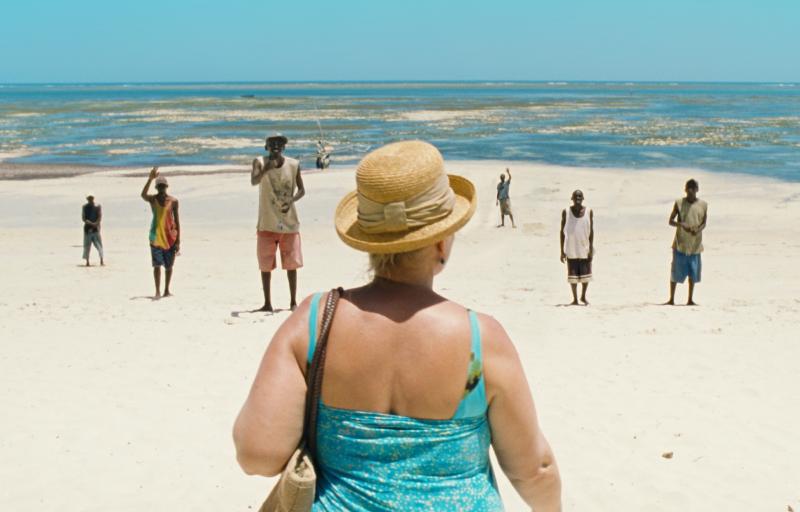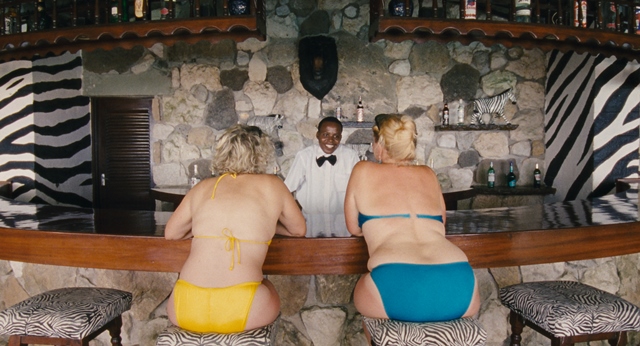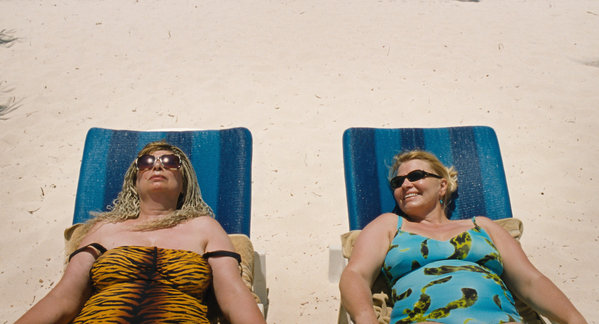PARADISE: Love | reviews, news & interviews
PARADISE: Love
PARADISE: Love
Austria’s master of discomfort focuses on sex tourism in the first of his trilogy on unusual holidays

The likelihood of leaving a screening of PARADISE: Love without feeling either queasy or at least a little off balance is low. This realist-styled portrayal of middle-aged Teresa’s excursion to Kenya to seek intimacy and, inevitably, sex is awkward viewing. Some scenes are so uncomfortable to watch that their imprint will be permanent. PARADISE: Love is made all the more an assault on perceptions of acceptability by being entirely unjudgemental.
Teresa (Margarethe Tiesel) is Austrian. She’s 50, a single parent, overweight and about to go on holiday. Just before she does, she takes her daughter to stay with her sister before she, in turn, goes away to diet camp. Teresa is heading south, on her own, to a beach resort in Kenya. She knows what's there.
 Beyond sun and sand, sex is available from the local men lining up on the beach, just beyond a cordon marking her hotel’s limits (the formal opening shot of them evokes Last Year at Marienbad). A guard patrols the perimeter. Teresa steps beyond it and is assailed by man after man. Eventually, she chooses Munga (Peter Kazungu), whose approach is more low key. After she instructs him on kissing and touching her breasts to her satisfaction, they have sex. They have further encounters. The sex tourists’s tenor is set by the women Teresa encounters. She’s told the local men's skin “smells of coconut.” A barman at the hotel is “as shiny as bacon rind” (pictured right). The men are commodities.
Beyond sun and sand, sex is available from the local men lining up on the beach, just beyond a cordon marking her hotel’s limits (the formal opening shot of them evokes Last Year at Marienbad). A guard patrols the perimeter. Teresa steps beyond it and is assailed by man after man. Eventually, she chooses Munga (Peter Kazungu), whose approach is more low key. After she instructs him on kissing and touching her breasts to her satisfaction, they have sex. They have further encounters. The sex tourists’s tenor is set by the women Teresa encounters. She’s told the local men's skin “smells of coconut.” A barman at the hotel is “as shiny as bacon rind” (pictured right). The men are commodities.
So are the visitors. Money is not explicitly asked for by those selling themselves. Instead, lines are fed about needing money to pay a relative's medical fees. Offering cash, Teresa has no idea of the value of the currency she holds out or the worth of the transaction. Another holiday maker had bought her consort a motor bike.The climax is an utterly painful set piece where Teresa's three new friends bring a local man into the hotel as a birthday present for her. Amongst other sexual hi-jinks, the quartet compete to see who can induce an erection. This is not the similarly themed Heading South. PARADISE: Love is explicit. Anyone discomfited by nudity – especially that of body types not usually seen in cinema – should beware (pictured below left: Margarethe Tiesel as Teresa, right, takes the sun with a friend).
PARADISE: Love is, indeed, partly about Teresa’s futile search for intimacy. A zoo scene is pivotal, and the only hint of Seidl’s perspective. Who is hunter and who is prey? Who is exploiting whom? The director does not explicitly state the film's relationship to colonialism and its aftershocks, but he doesn’t need to.
 Seidl has long been digging into societal taboos. PARADISE: Love’s hotel room scene ramps up the degradation of a prostitute seen in his last film Import/Export. His breakthrough, the 1995 documentary Animal Love, examined unhealthily close human-animal relationships.
Seidl has long been digging into societal taboos. PARADISE: Love’s hotel room scene ramps up the degradation of a prostitute seen in his last film Import/Export. His breakthrough, the 1995 documentary Animal Love, examined unhealthily close human-animal relationships.
The director also follows a series of self-imposed rules. The Ulrich Seidl Method guides him. In this, and in his transgressive nature, he is akin to Lars von Trier. The themes he dwells on are also not far from those which fascinate Lukas Moodysson: exploitation which occurs after crossing borders and sex as trade. But Seidl goes further than the Scandinavians. He is the master of generating discomfort.
Margarethe Tiesel’s extraordinarily sensitive portrayal of lost-soul Teresa will linger. So will the bad taste left by this purposely ambivalent film. If you can make it past PARADISE: Love, it’s followed into cinemas by the next entries in Seidl’s trio of films about these related characters' search for satisfaction: PARADISE: Faith – the story of Teresa’s sister’s holiday as a Catholic missionary; and PARADISE: Hope – the story of Teresa’s daughter’s holiday at diet camp. Brace yourself.
Watch the trailer for PARADISE: Love
The future of Arts Journalism
You can stop theartsdesk.com closing!
We urgently need financing to survive. Our fundraising drive has thus far raised £49,000 but we need to reach £100,000 or we will be forced to close. Please contribute here: https://gofund.me/c3f6033d
And if you can forward this information to anyone who might assist, we’d be grateful.

Subscribe to theartsdesk.com
Thank you for continuing to read our work on theartsdesk.com. For unlimited access to every article in its entirety, including our archive of more than 15,000 pieces, we're asking for £5 per month or £40 per year. We feel it's a very good deal, and hope you do too.
To take a subscription now simply click here.
And if you're looking for that extra gift for a friend or family member, why not treat them to a theartsdesk.com gift subscription?
more Film
 Steve review - educator in crisis
Cillian Murphy excels as a troubled headmaster working with delinquent boys
Steve review - educator in crisis
Cillian Murphy excels as a troubled headmaster working with delinquent boys
 Can I get a Witness? review - time to die before you get old
Ann Marie Fleming directs Sandra Oh in dystopian fantasy that fails to ignite
Can I get a Witness? review - time to die before you get old
Ann Marie Fleming directs Sandra Oh in dystopian fantasy that fails to ignite
 Happyend review - the kids are never alright
In this futuristic blackboard jungle everything is a bit too manicured
Happyend review - the kids are never alright
In this futuristic blackboard jungle everything is a bit too manicured
 Robert Redford (1936-2025)
The star was more admired within the screen trade than by the critics
Robert Redford (1936-2025)
The star was more admired within the screen trade than by the critics
 Blu-ray: The Sons of Great Bear
DEFA's first 'Red Western': a revisionist take on colonial expansion
Blu-ray: The Sons of Great Bear
DEFA's first 'Red Western': a revisionist take on colonial expansion
 Spinal Tap II: The End Continues review - comedy rock band fails to revive past glories
Belated satirical sequel runs out of gas
Spinal Tap II: The End Continues review - comedy rock band fails to revive past glories
Belated satirical sequel runs out of gas
 Downton Abbey: The Grand Finale review - an attemptedly elegiac final chapter haunted by its past
Noel Coward is a welcome visitor to the insular world of the hit series
Downton Abbey: The Grand Finale review - an attemptedly elegiac final chapter haunted by its past
Noel Coward is a welcome visitor to the insular world of the hit series
 Islands review - sunshine noir serves an ace
Sam Riley is the holiday resort tennis pro in over his head
Islands review - sunshine noir serves an ace
Sam Riley is the holiday resort tennis pro in over his head
 theartsdesk Q&A: actor Sam Riley on playing a washed-up loner in the thriller 'Islands'
The actor discusses his love of self-destructive characters and the problem with fame
theartsdesk Q&A: actor Sam Riley on playing a washed-up loner in the thriller 'Islands'
The actor discusses his love of self-destructive characters and the problem with fame
 Honey Don’t! review - film noir in the bright sun
A Coen brother with a blood-simple gumshoe caper
Honey Don’t! review - film noir in the bright sun
A Coen brother with a blood-simple gumshoe caper
 The Courageous review - Ophélia Kolb excels as a single mother on the edge
Jasmin Gordon's directorial debut features strong performances but leaves too much unexplained
The Courageous review - Ophélia Kolb excels as a single mother on the edge
Jasmin Gordon's directorial debut features strong performances but leaves too much unexplained

Add comment